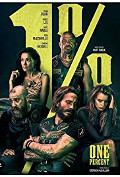
Directed by
Stephen McCallum
92 minutes
Rated MA
Reviewed by
Bernard Hemingway

1%
Synopsis: Paddo (Ryan Corr) has been caretaking outlaw Perth bikie gang, The Copperheads, while its President, Knuck (Matt Nable) has been in prison. When Knuck gets out he’s not happy with Matt’s new-fangled ideas and insists on sticking to the old ways. Paddo’s girlfriend (Abbey Lee) encourages him to take over the gang, whatever the cost.
Constituting his feature film debut, Stephen McCallum’s 1% (a reference not to Thomas Edison’s inspiration-to-perspiration definition of genius but to The Copperheads’ soi-disant status among bike gangs) opens at night with a convoy of bikies riding their hogs through a motorway tunnel. The roar of the bikes is amplified by the soundtrack’s industrial metal rock music with a singer screaming “lunacy, lunacy”. It’s a clearly foreboding opening whose tone the director adheres to without let for the remainder of his film.
Therein lies the problem, for although across-the-board 1% is well-made, who is going to want to sit through an hour-and-a-half of seriously mis-guided Neanderthals, f%cking and fighting their way through a story of no interest to anyone but themselves. With none of the entertainment value of the iconic ‘70s Aussie biker movie, Stone (1974), there are lean pickings to be had here.
Scripted by Matt Nable who wrote and directed the impressive football film, The Final Winter in 2007, 1% has a similarly strong sense of authenticity (Nable also plays the frighteningly aggressive Knuck) and even despite the reprehensible goings-on, some measure of humanity, with Simone Kessell as Knuck’s wife bringing a much needed counterpoint to the brutal machismo. Together the pair are the powerhouse core of the film, their relationship delivering a persuasive life-likeness. Corr and Lee are less convincing, not so much because of their performances than because their roles are a little too generic and they (Lee in particular) are too photogenic to fit with their tawdry environment. Better use too could have been made of the narrative strand involving Paddo’s developmentally-challenged brother, Skink (Josh McConville), who remains throughout mainly as a standing-in-the-shadows plot device.
Cinematographer Shelley Farthing-Dawe shoots the film largely in suitably low-lit, colour-leached interiors and Chris Cobilis’s score also makes a strong contribution to the oppressive atmosphere. McCallum’s direction is impressively assured for a feature debut although when in the climactic (and somewhat anti-climactic) shoot-out Knuck’s gang turns tail and flees, it’s not clear if the humour is intended. And where, pray tell, were the cops during all this?
At the end of the day one can only wonder if anyone at ScreenWest and Screen Australia, the project's funding bodies asked themselves who is going to want to watch this film. The answer seems obvious but maybe this is easy in hindsight. It is far from being the first time we have seen taxpayer money sunk in unwatchable films. It probably won’t be the last.

Want more about this film?


Want something different?




